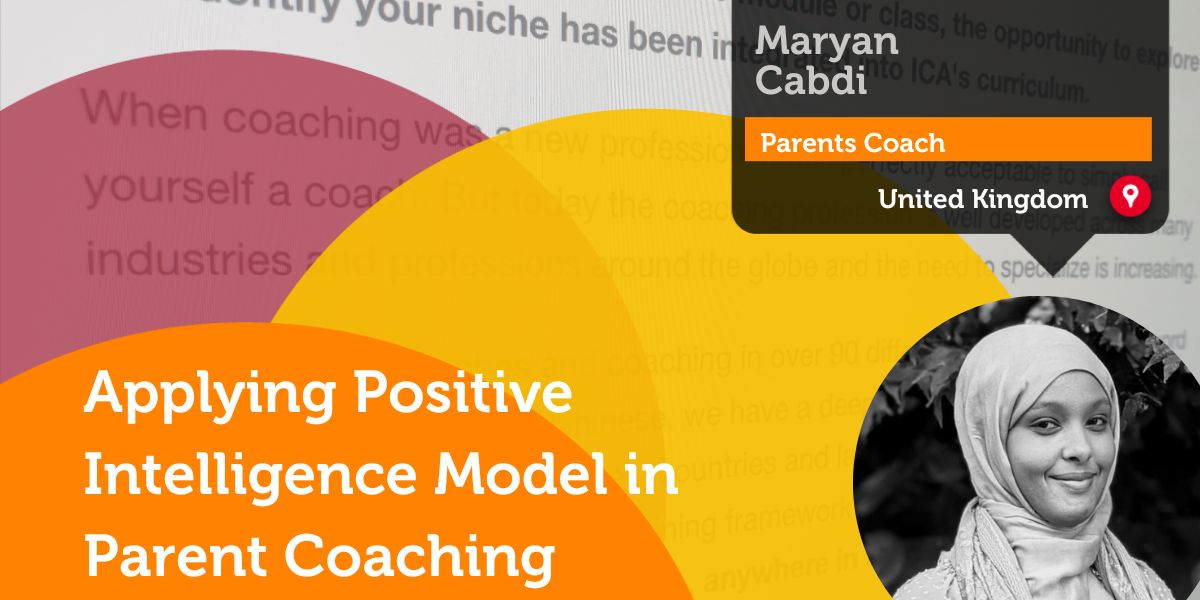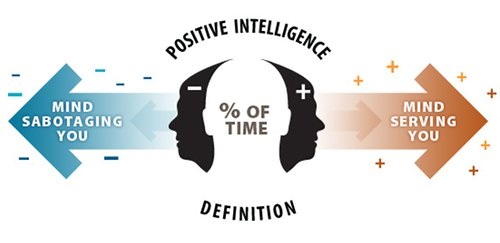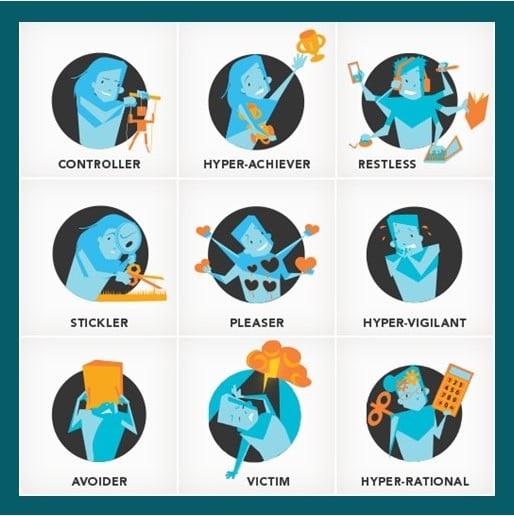A Research Paper By Maryan Cabdi, Parents Coach, UNITED KINGDOM

Applying Positive Intelligence Model in Parent Coaching
Throughout this paper, I will be discussing how a Positive Intelligence (PI) model can be embedded and imposed in parental coaching approaches. I will begin by first dividing my discussions into four components then followed by the conclusion :
- What is Parental Coaching?
- What is the Positive Intelligence Model?
- The importance and ways of embedding PI onto Parental Coaching.
- Application of PI Model to Parent Coaching Sessions.
What is Parental Coaching
As we all know, the parents, just like any other human being, can struggle with mental fitness and well-being, however, parents’ psychological issues can directly affect their child’s life. The parenting style strongly affects children’s development and well-being in different domains such as emotional, physical, mental, and identity development.
Therefore supporting the parent in the parenting journey is crucial for the well-being of both Parent and child, also it helps parents engage positively with their children, teaching them the behaviors and skills that they need to cope with the world. There are various parenting challenges such as overestimating or Underestimating children’s behavior, having unrealistic expectations, and being Inconsistent. Therefore it is always helpful to seek supportive intervention from a professional such as a parent coach.
Parent coaching is aimed at helping the parents achieve better results in understanding and meeting their child’s development needs, navigating different parenting strategies, improve communication and coping skills. Parental Coaching supports parents to enhance their confidence and self-efficacy and develop solution-focused thinking for different parenting challenges.
The coach partners with the parents to achieve an implicit large goal for example re-establishing positive family relationships, then this goal will be divided into smaller goals like improving communication and parenting strategies.
What is Positive Intelligence?

Positive intelligence is a framework model that combines positive psychology, neuroscience, cognitive psychology, and performance science. Positive Intelligence supports and trains the brain to be more positive just like training muscles at the gym to be stronger. According to recent research on neuroplasticity—the ability of the brain to change even in adulthood—reveals that as people develop new habits, they are rewiring their brains. In regards to parenting skills, this means there is room for improvement for parents with old unbeneficial habits when raising their children.
Positive Intelligence focuses on empowering self-awareness and helps with activating positive affirmations and perspectives, and on the other hand, it supports the brain from being hijacked by negative perspectives and feelings.
As the author Shiezad states in his book
The mind can be the person’s best friend or worst enemy. Positive Intelligence measures the relative strength of these two modes of your mind. High Positive Intelligence means your mind acts as your friend far more than as your enemy. Low Positive Intelligence is the reverse. Positive Intelligence is therefore an indication of the control you have over your own mind and how well your mind acts.
In fact, the model displayed above is quite needed to support the parent to have a more optimistic and positive mindset when faced with parenting problems such as children’s challenging behaviors. Positive Intelligence achieves the above goals by implantation of the following three activities :
- Evoking awareness: Identify your Saboteur mode which includes negative thoughts and limiting beliefs, then label your emotions at that moment.
- Self-Command practice: this is by doing some exercises (such as meditation or physical movements ) to distract your saboteur mode and activate your sage mode.
- Reinforce the positive (Sage) perspective by choosing positive feelings and actions such as empathizing, exploring, innovating, navigate.
How Positive Intelligence Can Support Positive Parenting:
The Positive Intelligence model supports the parents to recognize their emotions and regulate them before responding to children’s actions. Parents who can self-regulate their emotions are more successful in handling parental conflicts and challenges because they choose to have more positive responsiveness, hence this will support both the parent and the child from mental meltdowns.
According to several studies including the research article by author Alberto Alegre ‘Parenting Styles and Children’sEmotional Intelligence: What do We Know?’ There is an important relationship between parenting styles and emotional intelligence. According to the article, there are four main dimensions of parenting are identified that are relevant to the study of emotional intelligence: parental responsiveness, parental positive demandingness, parental negative demandingness, and parental emotion-related coaching, all these emotional dimensions influence the parent’s attitude when communicating with a child, hence it will weaken or strengthen their relationship.
Another important finding from the above research article is that positive parental demandingness is related to children’s higher emotional intelligence. In contrast, parental negative demandingness is related to children’s lower emotional intelligence, therefore addressing the parenting style helps with identifying the parent’s habits and communication, this will be further discussed in the (The application of parent coaching with positive intelligence model) section.
The main focus for Parenting coaching with positive intelligence is raising the parent’s awareness and positive attitude towards the child’s characteristics, needs, and situations, consequently, that will improve the Parent-Child relationship.
The PI model can help parents to understand what are the barriers that are holding them back from dealing with any parenting challenge like disciplining their children correctly.
And that happens through doing two tests: the first one is to find out your Saboteur and the second test is to measure the mental fitness PQ score.
Explanation of Saboteur Discovery Assessment:
In PI Saboteurs are referred to the subconscious and automated patterns of negative thoughts or voices in the mind that cause negative emotions such as anger, stress, self-doubt, and frustration. They sabotage any progress in performance and potential for happiness and healthier relationships.
On the other hand, the sage is the positive thoughts, emotions, and beliefs and they are activated by neurons in the middle prefrontal cortex or simply called the right region of the brain. These positive emotions include compassion, calmness, joy, gratitude, creativity, and empathy, etc. Activating these emotions helps with handling life’s challenges with a clear awareness of situations and supports making wise decisions and actions.
How Saboteurs Can Negatively Influence Parenting Skills:

The Judge Saboteur
This saboteur can put parents in tunnel vision and they can become obsessive about future risks, focusing on mistakes and shortcomings with an inner voice such as ‘you are a useless parent and cannot get things right. This saboteur can cause a decrease in the parent’s self-esteem and increases their stress.
Accomplice Saboteur
Hijack any opportunities to learn from mistakes and creativity in finding solutions for repetitive parenting challenges
Avoider Saboteur
Focusing on the positive and pleasant in an extreme way. Parents with this saboteur usually avoid discussions or conflicts with partners or children and that can affect their positive parenting and disciplining skills.
Controller Saboteur
Parents who have this saboteur are more likely to have an anxiety-based need to take charge and control situations and their children’s actions to one’s own will. This can cause anxiety in children if they make mistakes causing their self-esteem to decrease. In terms of how this saboteur can affect children’s behavior, the child will have either a rebellion or passive behaviors as a reaction to the parent controlling approaches.
Hyper-Achiever
Dependent on constant performance and achievement for self-respect and self-validation. The latest achievement was quickly discounted, needing more. So in a parenting context, the parent will not enjoy and validate their little wins of the day and progress.
Hyper-Rational
Parents with such saboteurs lack empathy and emotional intelligence, they have an intense and exclusive focus on the rational processing of everything, including parental decisions. Can be perceived as uncaring, unfeeling, or intellectually arrogant and consequently their children are emotionally deprived.
Pleaser Saboteur:
Parents with this saboteur struggle with setting parental boundaries, they neglect their own needs and indirectly try to gain acceptance and affection by helping, pleasing, rescuing, or flattering others including their children. It’s hard for them to say NO to their children’s needs and become resentful as a result.
Restless Saboteur
Parents with this saboteur are over-consumed with their daily chores and they usually don’t have a self-care routine, rarely at peace or content with the parenting journey.
Stickler Saboteur
Perfectionism and a need for order and organization are taken too far. Parents with such saboteurs are anxiously trying to make too many things perfect in their own lives or their children’s lives.
Victim Saboteur:
Parents with saboteurs usually refuse responsibility and blame others for their own parental mistakes. Also, they use emotional and temperamental (guilt trips) as a way to gain attention and affection for their children.
How Do Discovering Saboteurs Can Support Positive Parenting:
If parents stay in these saboteur moods for long it can emotionally harm themselves and their children. The parent will be more likely to lose the ability to see clearly their mistakes and cause setbacks and impactful responses to the daily parenting challenge. Raising awareness about parents’ saboteurs helps with controlling their negative reactions and managing their anger when dealing with any challenging behavior of their children.
Therefore Saboteur Assessment will support parents to learn effective strategies for weakening their Saboteurs and automatic negative behaviors that are not serving their desired parenting goals. This is by simply observing and labeling their Saboteur’s thoughts or feelings every time they experience them.
To perform this test parents can go to Saboteur Assessment Instructions
Explanation of the PQ Assessment:
Similar to the importance of having physical fitness, being mentally fit can support people to handle life’s great challenges without mental stress, frustration, or other negative emotions.
Based on Shirzad Chamine’s research PQ stands for Positive Intelligence Quotient. The purpose of this assessment is to get more awareness of the parents’ current resilience mindset and mental fitness level by measuring the strength of their positive mental muscles versus the negative. The PQ score shows how often the parents’ thoughts and feelings are serving them versus sabotaging them.
To perform this test parents can go to Assessment Instructions
Explanation Of the Parenting Style Questionnaire:
Developmental Psychologists tend to focus on the four key parenting styles:
- Authoritarian Style: This is the most traditional style because parents are clearly in charge and children are expected to fall in line no matter what.
- Permissive Style: Parents don’t set or have clear boundaries for children. Also, they tend to offer too many choices which confuse children.
- Authoritative style: This is the best balance or the sweet spot between Authoritarian and Permissive parenting. This style helps both parents and children to take responsibility and communicate in a peaceful and respectful manner.
To complete this questionnaire parents can go to the Parenting Style Questionnaire
Application of Parent Coaching With Positive Intelligence Model:
Every parent is different, every family dynamic is different. So coaching conversations will provide opportunities for the parent to find suitable plans that will enhance their confidence and parenting skills.
What is unique about parent coaching within the PI model is that it gives the opportunity for the client to use assessment resources such as Saboteur discovery, PQ test, and parenting style questionnaire, this takes place either before or after coaching sessions so the integrity of the pure coaching approach inside the session is not interrupted. Also, other roles of Parent Coaches are to support parents with accountability and progress monitoring.
So typically the coaching journey with the PI model includes the following two main stages:
- Identifying the current mindset stage: Start with supporting parents to have more clarity and awareness of their current mindset and situation and how that is affecting their relationships with their children. This can be achieved by using the following tools PQ and Saboteur Assessment and Parenting Style questionnaire.
- Parent self-empowerment to make positive changes: After evoking awareness about the current parenting situation of the client, the Parent Coach will partner with parents on how they can help themselves in Creating a calm, more positive connection and presence in their Parenting journey.
This includes finding out more about the parent’s desired outcomes and how they can empower themselves to improve their parenting skills. The coach at this stage supports parents through systematic thinking to identify desired outcomes and perspectives shifts that will serve them throughout their parenting journey.
Also, the Parent Coach offers (suitable and relevant to sessions)resources that can support the parent client to further increase their knowledge after the session such as books and articles about positive parenting.
Implementing a Positive Intelligence Framework
Parents who are skillful in implementing a Positive Intelligence framework in their parenting experiences are more able to handle critical and stressful situations which can emerge in many different forms in their daily lives.
Coaching with the PI model supports parents to identify their conscious or subconscious negative behavioral patterns and empowers them to explore creative and effective strategies for parenting their children more positively and strengthening their family relationships.
References
Shirzad Chamine (2016) Positive Intelligence: Why Only 20% Of Teams and Individuals Achieve Their True Potential and How You Can Achieve Yours; Greenleaf Book Group Press, Austin, TX, USA. https://www.positiveintelligence.com/
Alegre, A.(2010). The Effects of Parenting Styles on Children’s Emotional Intelligence; Issued at East Stroudsburg University, Pa, USA.
Julia M. Chamberlain (2021) Parent Coaching: How It Works, What It Costs, & What to Expect
Bradley, B(2021) What Are the Different Parenting Style
ICA Learnsite